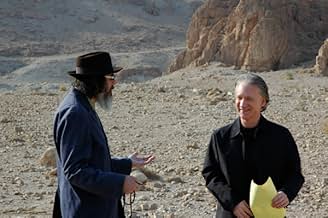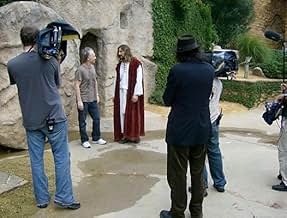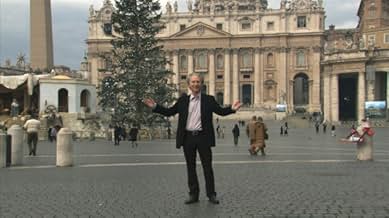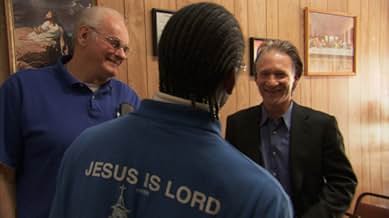Détendez-vous avec l'humoriste politique Bill Maher dans son voyage autour du monde où il interroge les locaux sur Dieu et la religion.Détendez-vous avec l'humoriste politique Bill Maher dans son voyage autour du monde où il interroge les locaux sur Dieu et la religion.Détendez-vous avec l'humoriste politique Bill Maher dans son voyage autour du monde où il interroge les locaux sur Dieu et la religion.
- Récompenses
- 2 victoires et 1 nomination au total
- Self - Director, National Institutes of Health
- (as Dr. Francis Collins)
- Self
- (as Father George Coyne PhD)
- Self
- (as Father Reginald Foster)
- Self
- (images d'archives)
- Self
- (as Dr. Dean Hamer)
Avis à la une
At a recent book signing at Joseph-Beth Booksellers here in Cincinnati, I spoke with screenwriter Joe Eszterhas, who recently found Christianity through his dilemma with throat cancer. (Yes, that Joe Eszterhas.) He claims to find it nearly impossible to sell his new script about St. Paul to Hollywood, professing that it's because there is a bias against Christianity in the studio system. Maher feels otherwise. His admitted intention behind making this comic documentary is because religious epics that have poured out of Hollywood since the dawn of cinema have endeared audiences to religions that, especially in their organized forms, preach and imply startling aversions to scientific and historical facts, take advantage of certain texts as means of racism, sexism and homophobia and other such things.
I am just now getting around to writing about Religulous, which I saw weeks before the Joe Eszterhas book signing, but I can't help but wonder about the differing viewpoints of a hilarious, righteously cynical Libertarian with whom I consistently agree and one of the highest-paid screenwriters who has worked for nearly half a century in the very system that he claims to oppose his newfound beliefs. Really, the truly surprising breadth of this film's release and commercial success (though I do know a few people in St. Louis who, last time we spoke, claimed it had yet to show there) should affirm Eszterhas's viewpoint, but actually seeing Maher's film is a different story.
This admittedly and purposely biased documentary is about Bill Maher's view of religion. As I find that he usually is, he's very smart, shrewd and funny, and I found the film pleasurable, even if from time to time he's a little unkind to his interviewees, who come off as objects of ridicule. He goes to holy places in Italy, Israel, Great Britain, Florida, Missouri and Utah, and talks with fanatics of the religions he confronts there.
A good confirmation of what I said earlier about opponents of Maher's views not being affected at all by this film is that he interrupts, talks over, spots subtitles and inserts movie and TV clips. The film's preaching to the converted and alienating of the non-converted is not a misstep by Maher and director Charles, but rather the intention. We relish his misconduct. The people he interviews are shockingly patient and tolerant, even most, not all, of the truckers in a makeshift truck stop chapel. You are dreading the point where one assaults Maher, but nobody does, although one trucker balls a fist and says, "You got a problem." Later in the film, there is an interesting moment where Maher walks out on a rabbi who favorably attend a Holocaust denial conference in Iran.
Persistently, Maher's altercations regard logical inconsistencies of holy books. Did Jonah really live for three days in the belly of a whale? No, of course not! It was a large fish! There are people who believe it. Is the End of Days nigh? A rather decent U.S. senator thinks so. Will the Rapture arise in our lifetimes? Common accord. Mormons believe Missouri will be the place to be, to which Maher quips with impeccable timing, "Branson, I hope." Maher visits the Creation Museum, to which I've been, thus I can corroborate the diorama of human children playing at the feet of dinosaurs. He didn't even penetrate the surface of what I saw there.
His two most logical guests, ironically, are Vatican priests, who with pleasure write off large parts of widely perceived Catholic beliefs, including the existence of Hell. One of these priests dies laughing as he mentions various beliefs that I was taught at Nativity Elementary. The other remarks that Jesus is polled sixth person to which Italians pray in crisis. The Hispanic pastor who believes he is the second coming of Christ will be disappointed.
Maher also has ominous questions Muslims about whether or not the Koran orders the death of infidels, leading to a frightening climax where he ties organized religion to a premature nuclear apocalypse, leaving us with the feeling that religion must be overshadowed for us to survive.
Religion is harmful to progress. Faith is the benefit of not thinking. Doubt is respectful. The Republicans I know personally all hate Bill Maher. No surprise there, but my point is this: There is little to zero chance that they, who tend to believe what this film ridicules, will see this film, and every chance that those of us, like me, who already love him, will rush to see this because essentially, it turns out to be a rallying of secularists who should be more alarmed and more active than they are. Maher's persona and his approach to the material are totally in sync with the midpoint of your any given agnostic intellectual young person, like me for instance.
While this film is not as funny as Borat, Religulous (which, at times is actually pretty scary) is a more powerful film because this film is true. For a project written by and starring Maher, the clips in the film are (for the most part) surprisingly fair. Maher does not try to make any of the people in the film look stupid (at least no more stupid than himself); in fact, he (usually) tries to help people consider the position not that their personal/religious beliefs are incorrect but that their personal beliefs may be incorrect. Most people in the film will not consider this possibility (these are the people Maher is warning us about), but several important and seemingly wise religious figures also featured in the film agree with Maher about the danger of certainty.
I recommend Frailty to anyone who would like to see a fictional, story-line illustration of the main theme of this documentary/propaganda film. I recommend Religulous to anyone who is comfortable enough with himself/herself to doubt their personal beliefs, to consider the possibility that (s)he might be wrong.
He manages to do this here and there but nowhere near consistent or good enough to make an argument capable of changing minds although perhaps good enough to provide food for thought. At the end of the film he gives a very good speech that sums up his film and this is probably the strongest part of the whole film as it challenges and makes reasonable points. OK it is loaded with imagery that backs up his points in a very blunt way but I can forgive him for this. What I have a problem with is that the rest of the film doesn't have this same core of logic and reasoned argument. He hits it here and there but too often he is doing two things. The first of these two things is that he will never give up an easy joke and this is not helped that his goal often seems to be that he seems very keen to mock people rather than reason with them. Hence we get the personal barbed remarks that are thrown out for the audience but the interviewees either don't hear or don't get their response shown. The second thing he does is select really weak people if his goal is anything other than mockery. I do agree with a lot of what Bill says particularly about the role of religion in world politics. I do believe in the concept that religious tenants within people's personal lives as guides and moral foundation is something I can live with but when things are taken as fact and taken totally literally then things get out of hand. So I do want to see Bill present a more rounded argument and have that debate with people who can talk to him at the same sort of intellectual level.
Sadly what we get are interviews with a priest who is a self-appointed doctor, a man who plays Jesus at the Holy Land theme park, a Muslim extremist British rapper (who let me say has ZERO profile over here), a man who is a reformed homosexual, a man who claims to be descended directly from Jesus and thus now leads the one true church and others of similar quality. We do have experts on the roster but they are mainly used to back up what Maher is saying. Now, I know many people do not like him, but to me Maher is too smart to need to be protected from reasonable discussion. The only exception I would give is the one priest he talks to who seems very liberal and open to taking the basics of his religion and getting away from dogma and ritual. Outside of him though Maher does not have a hard time showing them up but, when he occasionally gets someone who is a bit more careful with language and phrasing and can prevent themselves sounding like nuts, the film uses an even more cowardly trick. What we get are Maher filmed in the car talking about the interview, which very much gives him the final word and allows him to make responses and ridicule once the individual is not there to respond anymore. I do like Maher enough to watch his stuff, but this is a cheap trick and cheapens the film by extension. Of course this doesn't look as bad when you consider the heavy editing in of footage from other films some of it is fine to provide images, stimuli or just as a base but again mostly this is used to mock the subjects after the fact, the most unnecessary and annoying example being the use of Scarface the guy was doing fine making himself look crazy, it didn't need the heavy hand.
I read a comment on this website that said if you disagree with Maher then the film is not for you, it is about you sadly I have to agree with that. This film will do best with those who are coming to watch Maher put the boot in without a lot of finesse or intelligence just like he often does on Real Time. There are plenty of moments where he makes very good points and allows his subjects to talk themselves into a corner but too often he is selecting weak targets (people at a theme park!), mocking them with easy gags, letting them make themselves look like idiots (which many are) and then standing back as if he has proved something beyond the point that this person, right here, is an idiot, which he has not. It is a real shame because this should be a film for everyone even if not everyone likes it. If he is serious about his plea for moderates to look in the mirror then he needs to make a film that does that and, sadly, this isn't it. It provides food for thought and I did find it a rousing challenge to religion but it is nowhere near the film that he should have made.
For one thing, he makes it so clear how illogical the mass amount of people can be. He exposes phony beliefs and shows how they can become very protective against his film crew. The film stock they put into use is done masterfully. Plenty of laugh out loud moments (particularly the image of Jesus as a teenager, you will see). My word must be taken as truth when I say that the final part of the film MUST be seen. This isn't just about cracking jokes on faith. This film is about the human race taking responsibility of itself and stopping the damage it has been doing for far too long.
I truly hope religious people are not quick to brush this film off. For once, listen to the side from someone who is sincerely concerned about all of our futures.
Le saviez-vous
- AnecdotesThe film used the fake working title "A Spiritual Journey" in order to obtain interviews with religious leaders. They were unaware that Bill Maher was involved in the film until he arrived for the interviews.
- GaffesBill Maher conflates al-Hajaru al-Aswad, "the Black Stone" with the Kaaba, which is the building in which it is housed. There are several devotional objects in the Kaaba and Muslim pilgrims face the building rather than the stone.
- Citations
[last lines]
Bill Maher: The irony of religion is that because of its power to divert man to destructive courses, the world could actually come to an end. The plain fact is, religion must die for mankind to live. The hour is getting very late to be able to indulge in having in key decisions made by religious people. By irrationalists, by those who would steer the ship of state not by a compass, but by the equivalent of reading the entrails of a chicken. George Bush prayed a lot about Iraq, but he didn't learn a lot about it. Faith means making a virtue out of not thinking. It's nothing to brag about. And those who preach faith, and enable and elevate it are intellectual slaveholders, keeping mankind in a bondage to fantasy and nonsense that has spawned and justified so much lunacy and destruction. Religion is dangerous because it allows human beings who don't have all the answers to think that they do. Most people would think it's wonderful when someone says, "I'm willing, Lord! I'll do whatever you want me to do!" Except that since there are no gods actually talking to us, that void is filled in by people with their own corruptions and limitations and agendas. And anyone who tells you they know, they just know what happens when you die, I promise you, you don't. How can I be so sure? Because I don't know, and you do not possess mental powers that I do not. The only appropriate attitude for man to have about the big questions is not the arrogant certitude that is the hallmark of religion, but doubt. Doubt is humble, and that's what man needs to be, considering that human history is just a litany of getting shit dead wrong. This is why rational people, anti-religionists, must end their timidity and come out of the closet and assert themselves. And those who consider themselves only moderately religious really need to look in the mirror and realize that the solace and comfort that religion brings you actually comes at a terrible price. If you belonged to a political party or a social club that was tied to as much bigotry, misogyny, homophobia, violence, and sheer ignorance as religion is, you'd resign in protest. To do otherwise is to be an enabler, a mafia wife, for the true devils of extremism that draw their legitimacy from the billions of their fellow travelers. If the world does come to an end here, or wherever, or if it limps into the future, decimated by the effects of religion-inspired nuclear terrorism, let's remember what the real problem was that we learned how to precipitate mass death before we got past the neurological disorder of wishing for it. That's it. Grow up or die.
- Crédits fousAfter the credits, there is one last clip of Bill Maher with his mother and sister. He tells them "I'll see you in heaven", and they laugh. His mother says "who knows," and there is a title card "In loving memory of Julie Maher, 1919-2007".
- ConnexionsFeatures L'Odyssée des Mormons (1940)
- Bandes originalesCrazy
Written by Danger Mouse (as Brian Burton), CeeLo Green (as Ceelo Green) and Gianfranco Reverberi
Published by Chrysalis Music (ASCAP) / Warner -Tamerline Pub Corp. (BMI) o/b/o Wanrer/ Chappell Music Ltd PRS/ Killer Tracks (BMI)
Performed by Gnarls Barkley
Courtesy of Downtown Records and Atlantic Recording Corp. by arrangement with Warner Music GRoup Film & TV Licensing
Meilleurs choix
- How long is Religulous?Alimenté par Alexa
- What does "religulous" mean?
Détails
Box-office
- Budget
- 2 500 000 $US (estimé)
- Montant brut aux États-Unis et au Canada
- 13 011 160 $US
- Week-end de sortie aux États-Unis et au Canada
- 3 409 643 $US
- 5 oct. 2008
- Montant brut mondial
- 13 639 115 $US
- Durée1 heure 41 minutes
- Couleur
- Mixage
- Rapport de forme
- 1.78 : 1
Contribuer à cette page
























